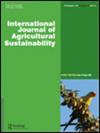Saffron growing in Italy: a sustainable secondary activity for farms in hilly and sub-mountain areas
IF 3.3
2区 农林科学
Q1 AGRICULTURE, MULTIDISCIPLINARY
International Journal of Agricultural Sustainability
Pub Date : 2023-10-30
DOI:10.1080/14735903.2023.2270263
引用次数: 0
Abstract
Italy has faced a renewed interest in the production of saffron (Crocus sativus L.) in recent times. However, little is known about the status of this agri-food chain. This exploratory study investigates saffron production (from agronomic to social and marketing aspects) in Italy through 162 interviews with farmers. A large part of them (38%) are young, often at a higher level of literacy (bachelor or master) and new entrants in the agricultural sector (data significantly higher than the average for Italian farms). In more than half the cases, saffron production is considered a complementary activity, with an average production of 332 g per farm per year. Saffron farms are spread throughout Italy and are generally located in hilly/sub-mountain areas (between 143 and 703 m a.s.l.). Only 1% of farmers use agrochemicals, and more than 90% do not need irrigation, while just 40% of farms are mechanized, saffron can then be considered a low-input and sustainable choice for farms in marginal areas. Farmers focus on a high-quality product, certified by quality and sustainability labels. However, supply chain coordination, and knowledge and innovation support should be further developed to promote this sustainable production.藏红花在意大利的种植:丘陵和亚山区农场的可持续次要活动
意大利最近面临着对生产藏红花(Crocus sativus L.)的新兴趣。然而,人们对这条农业食品链的状况知之甚少。本探索性研究调查了藏红花生产(从农艺到社会和营销方面)在意大利通过162采访农民。他们中的很大一部分(38%)是年轻人,通常具有较高的文化水平(学士或硕士),并且是农业部门的新进入者(数据明显高于意大利农场的平均水平)。在一半以上的情况下,藏红花生产被认为是一种补充活动,每个农场每年的平均产量为332克。藏红花农场遍布意大利各地,通常位于丘陵/亚山区(海拔高度143米至703米之间)。只有1%的农民使用农药,90%以上的农民不需要灌溉,而只有40%的农场是机械化的,因此藏红花可以被认为是边缘地区农场的低投入和可持续选择。农民专注于高质量的产品,通过质量和可持续性标签认证。然而,供应链协调、知识和创新支持应该进一步发展,以促进这种可持续生产。
本文章由计算机程序翻译,如有差异,请以英文原文为准。
求助全文
约1分钟内获得全文
求助全文
来源期刊

International Journal of Agricultural Sustainability
AGRICULTURE, MULTIDISCIPLINARY-GREEN & SUSTAINABLE SCIENCE & TECHNOLOGY
CiteScore
5.90
自引率
23.50%
发文量
33
审稿时长
>12 weeks
期刊介绍:
The International Journal of Agricultural Sustainability ( IJAS) is a cross-disciplinary, peer-reviewed journal dedicated to advancing the understanding of sustainability in agricultural and food systems.
IJAS publishes both theoretical developments and critical appraisals of new evidence on what is not sustainable about current or past agricultural and food systems, as well as on transitions towards agricultural and rural sustainability at farm, community, regional, national and international levels, and through food supply chains. It is committed to clear and consistent use of language and logic, and the use of appropriate evidence to substantiate empirical statements.
IJAS increases knowledge on what technologies and processes are contributing to agricultural sustainability, what policies, institutions and economic structures are preventing or promoting sustainability, and what relevant lessons should be learned.
 求助内容:
求助内容: 应助结果提醒方式:
应助结果提醒方式:


